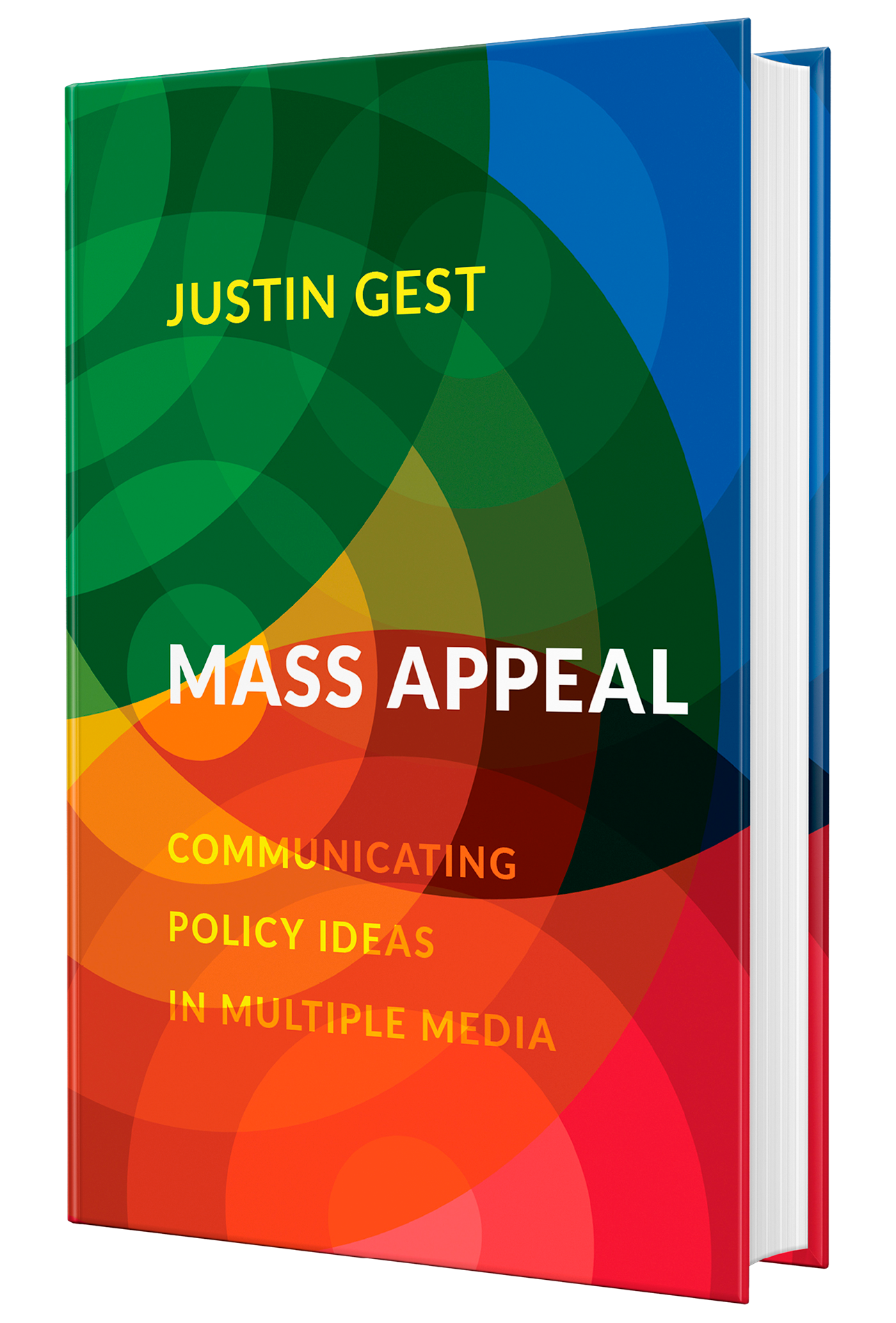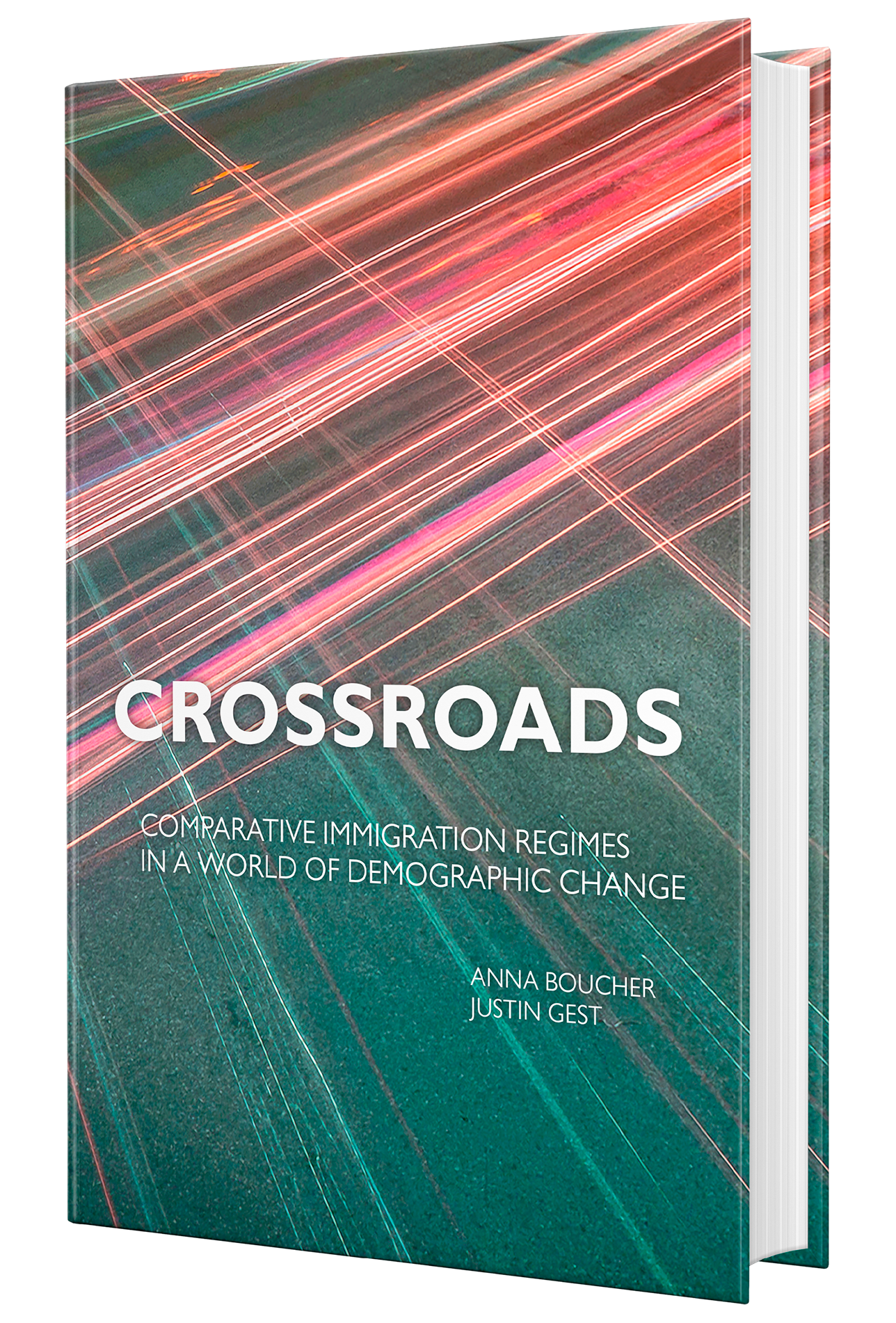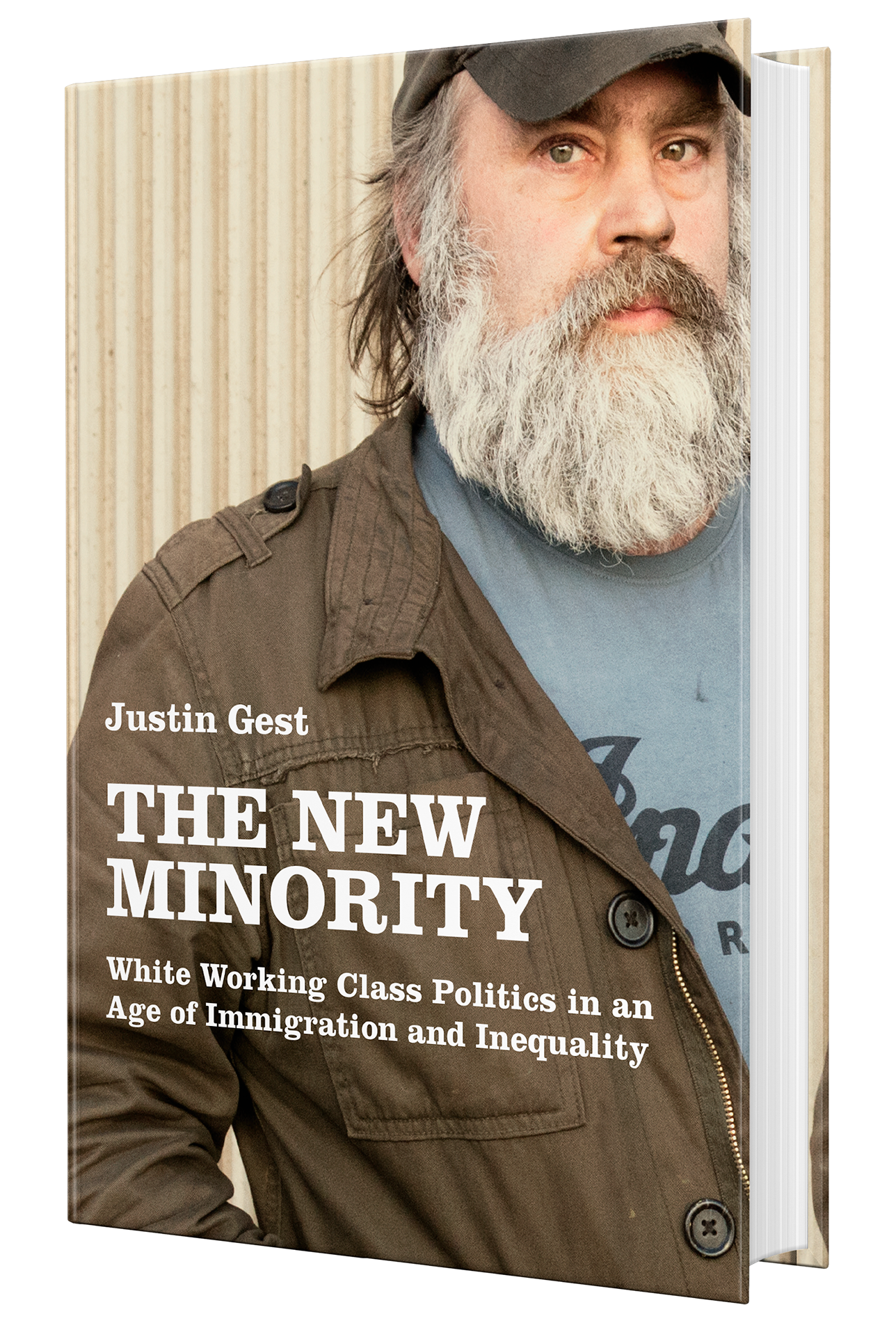How do societies respond to great demographic change? This question lingers over the contemporary politics of the United States and other countries where persistent immigration has altered populations and may soon produce a majority minority milestone, where the original ethnic or religious majority loses its numerical advantage to one or more foreign-origin minority groups. Until now, most of our knowledge about large-scale responses to demographic change has been based on studies of individual people’s reactions, which tend to be instinctively defensive and intolerant. We know little about why and how these habits are sometimes tempered to promote more successful coexistence.
To anticipate and inform future responses to demographic change, Justin Gest looks to the past. In Majority Minority, Gest wields historical analysis and interview-based fieldwork inside six of the world’s few societies that have already experienced a majority minority transition to understand what factors produce different social outcomes. Gest concludes that, rather than yield to people’s prejudices, states hold great power to shape public responses and perceptions of demographic change through political institutions and the rhetoric of leaders. Through subsequent survey research, Gest also identifies novel ways that leaders can leverage nationalist sentiment to reduce the appeal of nativism—by framing immigration and demographic change in terms of the national interest. Grounded in rich narratives and surprising survey findings, Majority Minority reveals that this contentious milestone and its accompanying identity politics are ultimately subject to unifying or divisive governance.
“Trenchant and groundbreaking work.”
—Molly Ball, National Political Correspondent, TIME Magazine
“The go-to source for understanding how demographic change is impacting American politics.”
—Jonathan Capehart, The Washington Post and MSNBC
“A treasure trove.”
—Thomas B. Edsall, Columnist, The New York Times
“A joy to read. . . A tour de force.”
—Eric Kaufmann, Professor of Politics, Birkbeck College, University of London
The New York Times: What the “Majority Minority” Shift Really Means for America
POLITICO: How Biden Can Unify America
The Washington Post: How The Left Can Embrace Nationalism
MSNBC: Immigration Politics and Russia’s Invasion of Ukraine
Foreign Policy: When White People Become a Minority in America
CNN: What America Would Look Like with Zero Migration
Foreign Policy: Does Guyana Foretell an American Future?
CNN: Our Country Is Tearing Itself Apart. Here’s One Way to Bring People Together.
Mass Appeal: Communicating Policy Ideas in Multiple Media
Policy researchers and experts across many subjects spend their professional lives developing ideas with public implications, but many are unable to make a public impact. A key reason for this is that higher education undervalues a critical tool for translating policy ideas into action: the ability to communicate those ideas broadly, strategically, and effectively.
To address this communication gap, Justin Gest has written a primer to help public policy students, multi-disciplinary researchers, and policy professionals turn their analyses into clear and persuasive campaigns with mass appeal. In clear, concise prose, he lays out how to transform sophisticated ideas into accessible media formats and how to target the desired audience. Each chapter includes advice from world-class practitioners and an example to illustrate paragons of different forms of communication:
- executive summaries
- press releases
- op-eds and blogs
- briefings
- broadcast interviews
- elevator pitches
- social media
“Gest practices what he preaches: Mass Appeal is written with clarity, precision, and clear target in mind. Too many brilliant ideas and insights are trapped in the weeds of expert jargon. Gest shows you the path out of the jungle and into the light.”
—Edward Luce, Financial Times
“This much-needed book provides the essential building blocks for communication and an array of examples that will help students and professionals write and speak more effectively.”
—Sophia Kalantzakos, New York University
“Justin Gest’s Mass Appeal is concise, compelling, and powerful—just like good strategic communication itself. Loaded with real-life examples and practical advice, the book lays out why strategic communication matters and how to do it effectively.”
—Beth Knobel, Fordham University
LSE Impact Blog: Why Don’t You Publish Your Research Here?
Crossroads: Comparative Immigration Regimes in a World of Demographic Change
In this ambitious study, Anna K. Boucher and Justin Gest present a unique analysis of immigration governance across thirty countries. Relying on a database of immigration demographics in the world’s most important destinations, they present a novel taxonomy and an analysis of what drives different approaches to immigration policy over space and time. In an era defined by inequality, populism, and fears of international terrorism, they find that governments are converging toward a “Market Model” that seeks immigrants for short-term labor with fewer outlets to citizenship—an approach that resembles the increasingly contingent nature of labor markets worldwide.
“An ambitious and indispensable resource.… Its depth and intellectual sophistication make it heads and shoulders above everything that has preceded it. Simply put, it is a book whose time has come.”
—Anthony M. Messina, John R. Reitemeyer Professor of Political Science, Trinity College
“An instant point of reference.… Few books so well serve the interests of academics and policymakers alike.”
—Susan F. Martin, Donald G. Herzberg Professor Emerita in International Migration, Georgetown University
“A comprehensive and compelling study of immigration regimes around the world.… Path-breaking and illuminating. Future studies of immigration governance will need to begin here.”
—T. Alexander Aleinikoff, Deputy High Commissioner (2010-2015), United Nations High Commission for Refugees
The New York Times: What Can the U.S. Learn From How Other Countries Handle Immigration?
POLITICO: How America Fell Behind the World on Immigration
POLITICO: The Moneyball Fix for Immigration Policy
The Guardian: Points-Based Immigration Was Meant to Reduce Racial Bias. It Doesn’t.
Los Angeles Times: Trump’s Immigration Plan Doesn’t Have to Be Dead On Arrival
The White Working Class: What Everyone Needs to Know
In recent years, the world has been reintroduced to the constituency of “white working-class” people. In a wave of revolutionary populism, far right parties have scored victories across the transatlantic political world: Britain voted to leave the European Union, the United States elected President Donald Trump to enact an “America First” agenda, and Radical Right movements are threatening European centrists in elections across the continent. In each case, white working-class people are driving the reaction to the social change brought by globalization. In the midst of this rebellion, a new group consciousness has emerged among the very people who not so long ago could take their political, economic, and cultural primacy for granted.
In The White Working Class: What Everyone Needs to Know®, Justin Gest provides the context for understanding this large group of people. He begins by explaining what “white working class” means in terms of demographics, history, and geography, as well as the ways in which this group defines itself and has been defined by others. Gest also addresses whether white identity is on the rise, why white people perceive themselves as marginalized, and the roles of racism and xenophobia in white consciousness. Finally, he looks at the political attitudes, voting behavior, and prospects for the future of the white working class. This accessible book provides a nuanced view into the forces driving one of the most complicated and consequential political constituencies today.
The American Prospect: Can the Democratic Party Be White Working Class, Too?
POLITICO: Why Trumpism Will Outlast Donald Trump
Reuters: Donald Trump Takes White Working Class People Down With Him
Reuters: Dispatch from Deep in the Heart of Trump Country
Reuters: Strange Bedfellows: Donald Trump and the White Working Class
The New Minority: White Working Class Politics in an Age of Immigration and Inequality
It wasn’t so long ago that the white working class occupied the middle of British and American societies. But today, members of the same demographic, feeling silenced and ignored by mainstream parties, have moved to the political margins. In the United States and the United Kingdom, economic disenfranchisement, nativist sentiments and fear of the unknown among this group have even inspired the creation of new right-wing parties and resulted in a remarkable level of support for fringe political candidates, most notably Donald Trump.
How did a group of people synonymous with Middle Britain and Middle America drift to the ends of the political spectrum? What drives their emerging radicalism? And what could possibly lead a group with such enduring numerical power to, in many instances, consider themselves a “minority” in the countries they once defined? In The New Minority, Justin Gest speaks to people living in once thriving working-class cities—Youngstown, Ohio and Dagenham, England—to arrive at a nuanced understanding of their political attitudes and behaviors. In this daring and compelling book, he makes the case that tension between the vestiges of white working-class power and its perceived loss have produced the unique phenomenon of white working class radicalization.
“Justin Gest brings to his craft a rare combination of scientific rigor and journalistic storytelling, which is why The New Minority stands out. It’s a deeply revealing account of what’s happened in our communities and in our politics.”
—Matt Bai, national political columnist for The Washington Post
“With both sympathy and objectivity, Justin Gest explains the tragedy beneath the anger of the white working class. They have not only lost good jobs and incomes, but also their middle-class social status and the respect-and gratitude-of the larger society. Political elites pretend to be surprised and bewildered by them. Yet it is those same governing elites who engineered this great injury to working people. This will be illuminating reading for anyone who seeks to understand the motivations and the possible impact of this ‘new minority,’ particularly in light of the upcoming presidential election.”
—Bill Greider, national correspondent for The Nation
“An incredibly timely book. White working-class dynamics explain the populist-right surge and centre-left slump in Europe. They underpin rising white suicide rates and Trump support in America. Justin Gest asks poor whites the penetrating questions that help us understand.”
—Eric Kaufmann, University of London, author of Changing Places: The White British Response to Ethnic Change
“In The New Minority, Justin Gest transcends the usual arguments about the defensiveness and disaffection of the working class to develop a schema for understanding multiple forms of white working-class political expression. Based on a fascinating set of interviews with working-class residents of London and Youngstown, Ohio, Gest deftly connects their voices of frustration and resignation to their political beliefs and behavior. The result is an important analysis of an increasingly vocal and visible group in American and British politics.”
—Monica McDermott, Department of Sociology, University of Illinois, Urbana-Champaign
The Washington Post: The Real Reason the White Working Class Still Support Trump
POLITICO: “I’m Not A Racist, But…”
CNN: The GOP Base Is Shrinking Fast. So Why Does its Power Seem So Secure?
POLITICO: The Two Kinds of Trump Voters
The Guardian: Labour Is Moving Close to Disaster. How Can it Reconnect with its Roots?
Apart: Alienated and Engaged Muslims in the West
Muslim minorities comprise an ever-increasing proportion of Europe’s population, but are official strategies to thwart home-grown terrorism forcing Muslims further to the fringe of our societies? For every terror suspect we see handcuffed in a televised trial, thousands of young Muslims outside the courtroom live an alienated existence in the boroughs and barrios of the Western world. Apart explores the nature of their disaffection and attraction to groups that undermine the system that remains their primary means of inclusion in society.
Based on research conducted in London’s East End and Madrid’s Lavapiés district, and drawing on over one hundred interviews with extremists, gangsters, imams, elders, politicians, and those just trying to get by, Justin Gest explores young Muslims’ daily realities. Taking issue with conventional interpretations of inequality, discrimination, and religion, he argues that alienated behavior is distinguished not by structural factors, but by the expectations and perceptions of social agents. Gest shows that—contrary to conventional wisdom—attempts at assimilation are often unconnected with an individual’s sense of inclusion. Paradoxically, social and political integration are characteristic of those who spurn the social and political system, while the individuals most acutely aware of the rights, liberties, and cultural mores of democracy are most likely to have the deepest sense of disappointment about their non-fulfillment. Gest also discusses young Muslims’ need for norm-based stability in an era characterized by contested beliefs about nation, state, and faith. While sounding an unambiguous warning to European policy-makers, Apart presages an imminent American experience with the same challenges. How both government and peoples discipline their fear and understand their Muslim citizens may shape democratic social life in the foreseeable future.
“This much-needed book tells us why Muslims in the West stand ‘apart.’ Among its most disturbing findings is how little may separate democratic ‘engagement’ from radical ‘anti-system’ opposition. The book’s strength is its unique combination of analytic acumen and rich ethnographic description of second-generation Muslims’ lives in Madrid and London.”
—Christian Joppke, American University of Paris
“Justin Gest gives us a window into the diversity and complexity of European Muslim communities in a way few works have. His book delves deep into the demands of modern citizenship, engagement, and layered identities. His conclusions are at once intuitive and profound. The themes of this book will help define how a thriving democracy functions in the twenty-first century.”
—Dalia Mogahed, former advisor to President Obama for Faith-Based Partnerships
“An excellent piece of work. I learned a lot from it.… Balanced and judicious, with very interesting findings both on a comparative basis and on a generational one. I’m sure it will make its mark.”
—Lord Anthony Giddens, Professor Emeritus, London School of Economics
“Justin Gest’s carefully researched and well argued book brings a fresh perspective on the question of Muslim alienation in Europe…. His valuable methodological insights and judicious conclusions have a wider application.”
—Lord Bhikhu Parekh, Professor Emeritus, University of Westminster
“A thoughtful and compelling book offering a subtle account based on both new theoretical work and original case studies. It is a major contribution to contemporary political understanding, by a new voice in academic debate.”
—David Held, London School of Economics
The Guardian: A Bad Trade-off
The Guardian: Nothing Sells Papers Like a Villain
The Guardian: It’s Closer than You Think
The Guardian: Blears Needs to Take Her Message to the Streets





